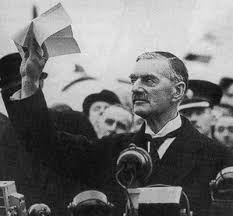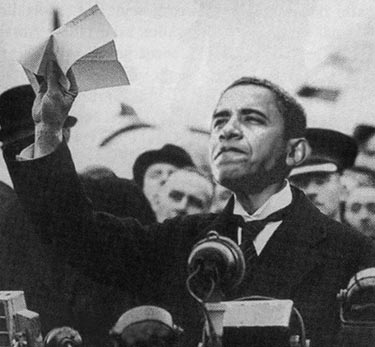
After signing the Munich Pact in 1938 Neville Chamberlain famously said this:
My good friends this is the second time in our history that there has come back from Germany to Downing Street peace with honor. I believe it is peace in our time.
I doubt if there was one reasonable Brit who believed that Chamberlain was deliberately lying. You’d be hard-pressed finding one reasonable American who believes Barack Taqiyya and John Kerry are not lying.

After making a deal with a plethora of Hitler-like ayatollahs Barack Taqiyya said:
For the first time in a decade we’ve halted the progress on Iran’s nuclear program.
Great Britain had Winston Churchill:
England has been offered a choice between war and shame. She has chosen shame and will get war.
America has John Kerry:
There is no agreement that they can enrich. They have the ability to negotiate it, but they could only gain that capacity to have some enrichment, as some countries do, if they live up to the whole set of terms necessary to prove it's a peaceful program. Iran has some very stiff hurdles that they are going to have to meet in order to do that.
It gets worse. The left dug up revisionist history from the 1950s that said Neville Chamberlain was right to sign the Munich Pact. That bit of appeasement political philosophy fits in nicely with this:
Obama Signals a Shift From Military Might to Diplomacy
By MARK LANDLER Published: November 25, 2013
http://www.nytimes.com/2013/11/26/world/middleeast/longer-term-deal-with-iran.html?_r=0
The Old Diplomacy v. The New Diplomacy
Books have been written on the subject. Scholarly tomes even offer dates separating the old and the new; however, my definitions of Old Diplomacy and New Diplomacy are less complicated than the definitions scholars put forth. I think of the Old Diplomacy as negotiations between sovereign nations going as far back as sovereign nations talked to one another. The New Diplomacy sublimates sovereignty to Internationalism. That is the kind of diplomacy our UN-loving State Department has been engaging in since 1945.
My definition of New Diplomacy incorporates all of the malevolence that sprang from WW I after the untimely death of the Old Diplomacy. Woodrow Wilson’s League of Nations supplied the pallbearers. I don’t see how anyone can deny it; especially when you trace today’s worsening evils to the New Diplomacy —— encouraging weak foreign governments to dictate to a strong free people. After the New World Order reins supreme there won’t be any free people left.
Diplomacy between Germany and England in 1938
Peace-at-any-cost-revisionists should be asked this question: If England was prepared for war would Chamberlain have stood up to Hitler? Truthful peaceniks might abandon their core belief and answer yes. My interpretation of events tells me that Chamberlain would have done exactly what Barack Taqiyya & Company are doing today.
Just to be clear, England was unprepared for war to be sure; nevertheless, the evidence shows that Hitler would have backed down had Chamberlain stood up to him. Example: Germany’s military did not believe they could win. The only chance Hitler had was a quick victory; i.e. invade England. That was not possible in 1938 before Germany occupied France. That reality was hardly a military secret in 1938 which makes Chamberlain’s thinking shortsighted to say the least.
NOTE: Invading England was not possible after German armies were entrenched on the shores of the English Channel.
On the other side of the argument it can be said that “Peace in our time.” might have given Germany the atomic bomb when it was ready to attack. Analyze that possibility in relation to Iran.
America and Iran in 2013
America and its allies are militarily stronger than Iran. There is no reason to give the ayatollahs the time of day. Not only should enrichment be stopped, Iran’s entire nuclear industry should be dismantled if the ayatollahs so much as blink.
Here’s the betrayal. Unlike England and Germany in 1938 Iran can be slapped down. Diplomacy is the only thing standing in the way.
Incidentally, China and Russia are not today’s version of Great Britain finally going to war to save Poland in 1939. There is no possibility the US would attack China or Russia the way Germany conquered weaker countries. Russia and China have no reason to risk nuclear war against the US and its allies in order to defend Iran.
Also, there is lot of talk about the fear of uniting a billion Muslims. Even if that is true they should be seen as that many more targets if they don’t straighten up and fly right. Happily, a lot of Muslim countries are not thrilled with the prospect of a nuclear Iran. Those Muslims who are suspicious of Iran did not require diplomacy to tell them where their best interests lie.
Finally, I’ve read dozens of quotes about diplomacy credited to the famous and the not so famous. I don’t believe any of them.
Here are some “quotes” of my own:
1. Diplomacy is the favorite weapon of the weak.
2. Diplomacy is a foul smelling cloak of decency worn by the dirtiest of politicians.
3. Diplomacy never prevented a war.
4. Diplomacy always loses the peace.
5. Diplomacy is never called upon when a government abuses its own people.
6. Diplomacy is a low-down word favored by historians trying to turn dead politicians into heros —— and to sell books.
7. Diplomacy sucks.
Last edited: